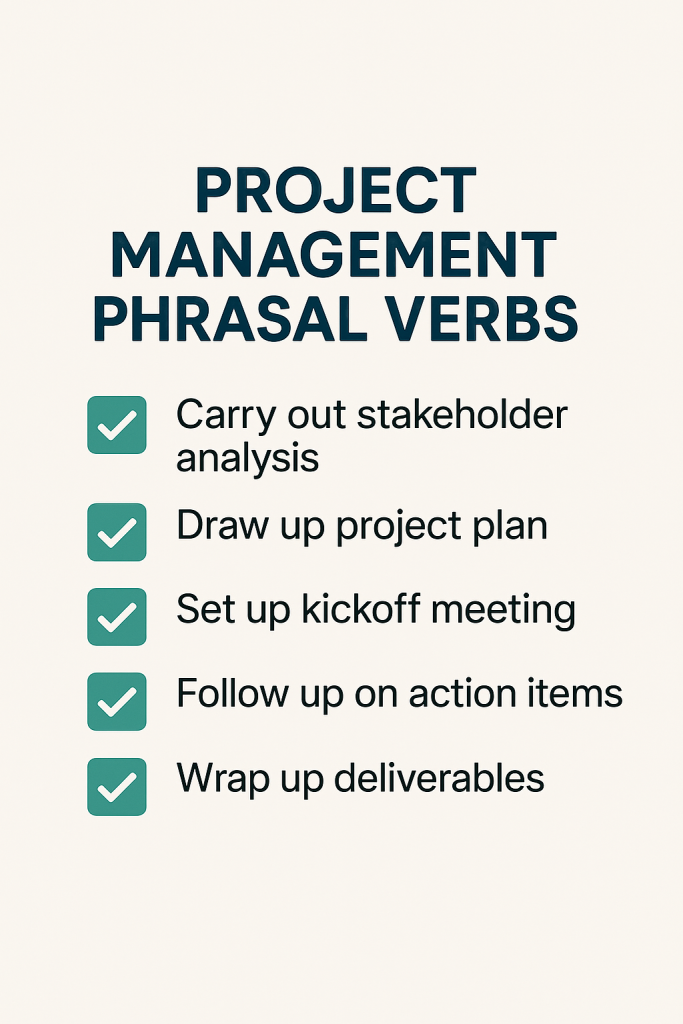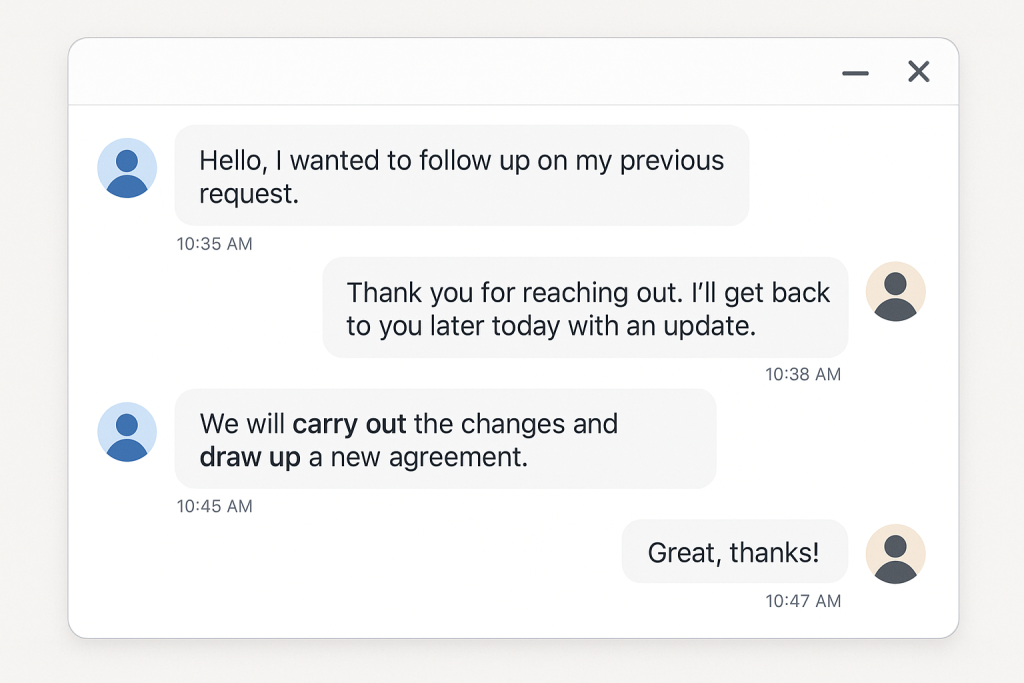Introduction
Let’s face it—sounding professional in English is less about knowing big fancy words and more about mastering the deceptively casual phrases that real people actually use. Enter: business English phrasal verbs. These handy little verb combos are the glue that holds the chaotic world of business chit-chat together.

This guide is your cheat sheet to dominating boardroom banter and sounding less like someone who translated their sentence in Google and more like someone who was born in a spreadsheet. Whether you’re a student trying to level up or a professional who keeps hearing “circle back” and thinking it’s about office chairs, this one’s for you.
Phrasal Verbs for Meetings
Run through
Meaning: Review something quickly, like your sanity before a Monday meeting. Example: “Let’s run through the agenda before the client arrives.” It works well with simple present tense structures, especially when you want to sound prepared even though you just read the email.
Put forward
Meaning: Suggest something, hopefully smarter than what Steve just said. Example: “She put forward a new strategy for the next quarter.” Pro tip: This is not the same as ‘put up with’, which is what we do with Steve.
Bring up
Meaning: Casually toss a topic into the corporate void. Example: “I want to bring up the budget concerns during the meeting.” Best used when you want to sound like a responsible adult.
Phrasal Verbs for Project Management

Draw up
Meaning: Create something formal, like a contract or a to-do list you’ll ignore. Example: “They drew up a new contract for the supplier.” This one makes you sound like a lawyer, or at least someone with a working printer.
Carry out
Meaning: Actually do the thing you said you would. Imagine that. Example: “The team successfully carried out the new marketing strategy.” Sounds way more competent than just “did it.”
Follow up
Meaning: Check in like a polite stalker. Example: “Please follow up with the client next week.” Bonus: You can’t be passive-aggressive without a good email comma.
Phrasal Verbs for Negotiations
Back down
Meaning: Politely surrender so everyone can move on with their lives. Example: “After some pushback, they backed down on the price.” It’s like waving the white flag but in business casual.
Talk over
Meaning: Discuss thoroughly, not just blurt opinions in Slack. Example: “Let’s talk it over before making a decision.” Note: Also means interrupt someone, but hey, nuance.
Break down
Meaning: Explain it like everyone’s five. Example: “Can you break down the budget forecast for us?” And if you need help with sentence basics, simple subjects are your friends.
Phrasal Verbs for Customer Relations
Reach out
Meaning: Contact someone in a non-creepy, businessy way. Example: “I’ll reach out to the client with the proposal.” Translation: I’ll send an email and then panic if they don’t reply in five minutes.

Set up
Meaning: Organize a meeting, a call, or your life. Example: “I’ll set up a call with the sales team.” This phrase is basically productivity cosplay. Also seen in simple sentences.
Phrasal Verbs for Reporting and Approval
Sign off on
Meaning: Approve something like a boss (or by your boss). Example: “The CEO signed off on the new campaign.” Use when pretending things don’t get lost in 47 Slack threads.
Look over
Meaning: Give it the ol’ review-and-pretend-you-read-it treatment. Example: “Can you look over the final draft before submission?” Be careful not to overlook what matters—like typos in that “important” proposal.
Helpful Resources
Wanna dig deeper into your English rabbit hole? You’re in luck:
- Become a business email wizard with these tips
- If “in, on, at” still haunt your dreams, fix it here
- Sound cooler with these lesser-known idioms
- Browse the FixyGrammar blog like you’re on a mission
- Still saying “their” when you mean “they’re”? Un-sabotage yourself
- See the full phrasal circus here
Conclusion
So, what have we learned, dear aspiring office linguist? Business English phrasal verbs are basically cheat codes for sounding fluent, smart, and vaguely intimidating. Whether you’re trying to impress your boss, survive a Zoom call, or just get someone to respond to your calendar invite, these verbs have your back.
Next time you want to put forward an idea or look over a document, do it with some flair—and maybe less fear.
Your turn! Which phrasal verb will you awkwardly test out this week? Drop it in the comments or casually slip it into your next awkward coffee chat.
And don’t forget to follow up with some actual practice. Your future fluent self will thank you.
